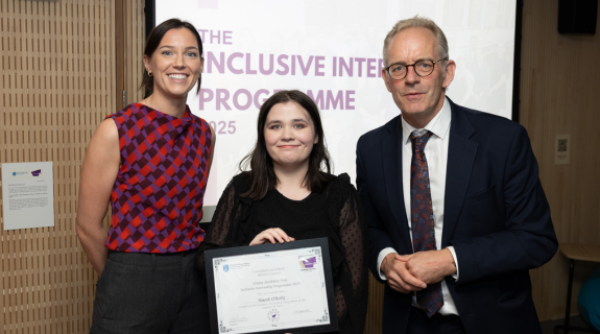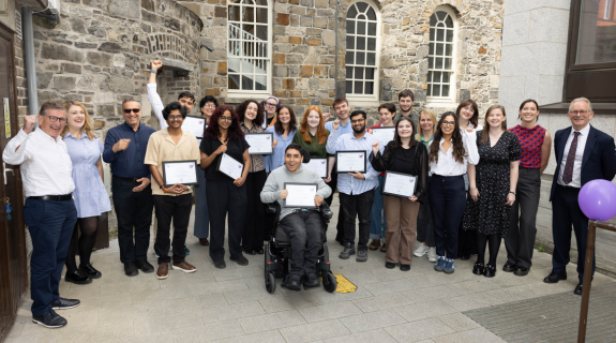Trinity's Inclusive Internship Programme aims to provide students of all years that are registered with Trinity’s DisAbility Service the opportunity to undertake a summer internship within a College Service, Department or School.
The School of Languages, Literatures and Cultural Studies participated in the Inclusive Internship Programme for the first time this summer. Our intern Niamh O’Reilly (English and French, 2026) joined the School to work on a number projects over the summer period, to improve the accessibility of digital materials for students across all our departments and programmes.

Niamh O’Reilly (centre) receiving her certificate for completing the internship programme, with Eithne Coleman Senior Occupational Therapist (Disability) and Professor Neville Cox, Registrar.
This summer, I participated in the DS Inclusive Internship Programme which is a unique opportunity for students to get valuable and practical experience in the working world. As a French student going into my final year, I was delighted to come across the opportunity to work behind the scenes of what goes into planning our classes. I really enjoyed working in a small office environment for the first time, and the staff couldn’t have been nicer to communicate with. The main tasks I completed were assisting with the Programme Handbooks and creating student support webpages for the new School website.
Firstly, each subject, say French or German, have a Handbook to give students information and supports for their upcoming classes and college experience. I was responsible for adapting these documents through a lens of accessibility. It is extremely important to make College materials legible and clear for everyone, including students who use reading aids.
Considering I am nearing the end of my degree, there are lots of supports I wish I knew about when starting college. I had the rare chance to promote helpful resources and answer common questions from a student perspective.
Linked to creating more accessible materials is increasing visibility of Student Supports. Considering I am nearing the end of my degree, there are lots of supports I wish I knew about when starting college. I had the rare chance to promote helpful resources and answer common questions, from a student perspective on the School’s website and social media. For example, a key part of the visibility process was making shorter videos intended for students studying languages and cultures in the School, like a wayfinding video for the Undergraduate Office, or places to study around campus. Ideally, any incoming students will become aware of concise information on who to contact and how to get involved, easing the difficult transition to university. Naturally it takes time to become adjusted to a new place, so establishing concise points of reference is essential.
I think for all of the interns we had not been in an environment where we were supported for our disabilities in such a collaborate and open manner. Ultimately, I thoroughly would recommend participating in the internship. It provides you with real life experience in a workplace that will help me greatly moving forward.
On the point of this being an internship facilitated by the Disability Service, they were always there to answer any questions us interns had about our reasonable accommodations or general advice. We got to attend a weekly intern meeting where we shared and compared our experiences. I think for all of the interns we had not been in an environment where we were supported for our disabilities in such a collaborate and open manner. Ultimately, I thoroughly would recommend participating in the internship. It provides you with real life experience in a workplace that will help me greatly moving forward.

Student participants in the 2025 Inclusive Internship Programme

/filters:format(webp)/filters:quality(100)/prod01/channel_3/media/tcd/langs-lits-cultures/images/news-and-events/Inclusive-Internship-2025-Niamh-OReilly-575X320px.png)